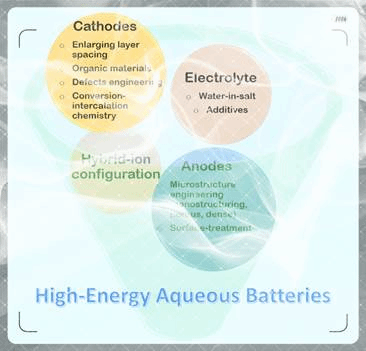Hongbo Geng, Professor, from the School of Materials Engineering recently published the title "Pathways towards high energy aqueous rechargeable batteries" in Coordination Chemistry Reviews (IF= 15.367)
Hongbo Geng, Professor, from the School of Materials Engineering recently published the title "Pathways towards high energy aqueous rechargeable batteries" in Coordination Chemistry Reviews (IF= 15.367).
Thesis link: https://www.sciencedirect.com/science/article/pii/S0010854520302253

Abstract: Aqueous rechargeable metal batteries (ARMBs) represent one type of energy storage technology with high theoretical energy densities, low cost and better safety. Their practical applications are hindered by the narrow voltage window of the aqueous electrolytes, limited efficiency in the intercalation/deintercalation of the metal ions (especially for the multivalent ions) and dissolution/structural variation of the electrodes in aqueous electrolytes. Effective strategies have been developed to address the above issues and significantly advanced performance and mechanistic understanding of the aqueous system. In this review, we highlight the representative strategies in achieving high-energy ARMBs, i.e., aqueous rechargeable Li/Na/K/Zn/Mg/Al ion batteries. Strategies in optimizing the composition/structure of conventional anodes and cathodes, progress of “water-in-salt” electrolyte, and novel ion storage mechanisms other than the intercalation chemistry will be discussed. It is expected that this review can provide a comprehensive overview of the status of the ARMBs and enlighten more research work that tackle the unsolved bottleneck issues.

Hongbo Geng is currently a professor in School of Materials Engineering in Changshu Institute of Technology. His research interests are on lithium (sodium)-ion batteries, aqueous zinc-ion batteries, etc. Prof. Geng has published 70+ peer reviewed papers in journals including Advanced Materials, iScience, Matter, Advanced Functional Materials and ACS Nano.
